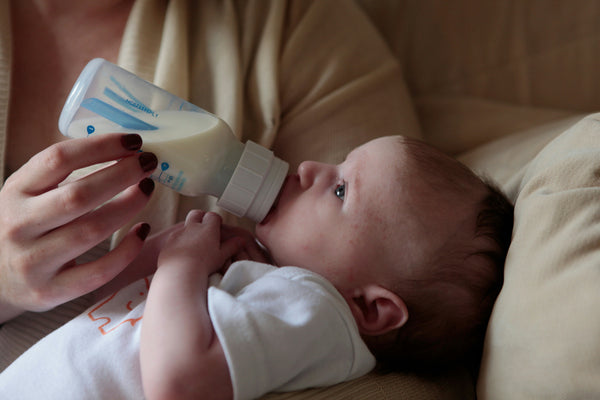Can Withholding Causes Chronic Constipation in Kids?
share this article

We eat great! So why is my kid constipated? As a Pediatric Physical Therapist who specializes in treating kids with chronic constipation, I frequently work with many families with kids who shouldn’t be constipated. Their kids get plenty of exercise and eat well. Their parents ask, “How can they possibly be constipated?”
These parents and many health care providers have bought into the myth that the only reason a person gets constipated is because they have neglected their diet and are too sedentary. Poor diet and a lack of exercise certainly contribute to occasional constipation. But when it comes to chronic constipation in kids, the culprit is often overlooked: withholding.
Let’s review how withholding can lead to chronic constipation in kids and the solutions we as physical therapists help implement to provide our kiddos with relief.
Top Reasons for Kid’s Withholding: Stress and Trauma
There are a few scenarios in early childhood that can lead to a kid experiencing an unpleasant bowel movement. Stress and anxiety from this memory can contribute to withholding. Some common instances might have also included:
-
The transition period when our little ones switched from breast milk or formula to cow’s milk
-
After an illness, when a kid goes several days without a bowel movement and then had a very large one
-
During the potty training stage, when our kiddos decided it is easier to hold a poop rather than to have one in daycare, so they held it in.
The longer a bowel movement hangs out in your body, the drier and harder it gets. In any case, their little baby/toddler mind didn’t like that experience of an uncomfortable poop. This can lead to withholding and if untreated, leads to chronic constipation.
What do humans do if we don’t like an experience? We avoid it. Kids will frequently start to withhold bowel movements before they even have the words to describe what they’re doing or why. And as busy parents, we might miss the signs that they’re doing it.
How Withholding Leads to Constipation
When a kid withholds their stool even for just a few days, a vicious cycle can begin: the stool they are holding in their rectum gets drier and harder and even more unpleasant to pass. The brain can quickly get used to this poop in the rectum, causing the kid to lose the sensation of needing to have a bowel movement. I tell my patients it’s as if I put a paperclip to their ear.
They will feel the paperclip at first, but after a bit they’ll forget it’s there. This frequently results in your little one continuing to withhold without even knowing they are withholding.
Daily reads to help your little ones lead happier and healthier lives.
Join the
Happy Gut Club
Withholding Can Change Muscle Function
Prolonged withholding can create changes in muscle function that result from that stool hanging out in the rectum. The rectum itself, which is a smooth muscle that contracts to push out poop, gets stretched out. A stretched-out rectum is less effective at contracting to evacuate any waste in the bowels. And the muscles of the anus (the anal sphincter) and the pelvic floor muscles get overly tight from holding all that poop in the body all the time.
This can result in a kid sitting on the toilet, wanting to poop, but the pelvic floor muscles not relaxing enough to let the poop out.
Solutions to Kids’ Withholding
Physical therapy is an effective way to treat the complications that arise from withholding, especially with any changes to muscle function. However, prevention is a lot easier than treating. If you are caring for a little one, part of the prevention strategy is to be on the lookout for withholding.
Kids are most likely to start holding back poops at these key moments:
-
Switching to cow’s milk
-
Potty training
-
Life transitions, such as starting kindergarten
When your kiddo is going through one of these transitions, be on the lookout for signs of withholding. These include:
-
Going up on their tip-toes or sitting on one heel (this is called Vincent’s courtesy, and it’s a well-known sign of withholding)
-
More difficulty sitting still and focusing on an activity
-
A sudden increase in flatulence, often very stinky
-
Denial of any bowel and bladder urges
If you suspect your kiddo is withholding, here’s my first piece of advice: refrain from asking them “do you have to go to the bathroom?” I would say that about 95% of the times I’ve heard an adult ask this of a kiddo, the answer is “no” Instead, I would change and rephrase the question to “It’s time to use the restroom!” and give them a lot of praise for being willing to try even if they don’t think they need to.
Establish a Potty Training Routine for Withholding Prevention
My second piece of advice is to set up a routine in your home or daycare that kids sit on the toilet after every meal. Your body is most likely to have a bowel movement about 15 minutes after a meal. For young kids especially, this routine will help them have bowel movements before they get into a situation where they prefer not to.
Summary
Withholding is often an overlooked behavior that leads to chronic constipation in kids. It can occur when kids are going through life transitions such as switching from breast milk to cow’s milk or after negative potty training experiences. Withholding can lead to changes in the muscle function, and kids can lose the sensation of needing to have a bowel movement after withholding for extended periods of time.
















